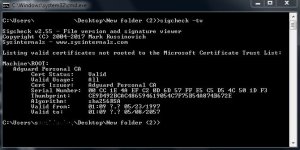- Apr 1, 2017
- 1,824
- 8,263
- 2,768
Hello friends, I was surfing the web and I found an interesting subject.
Dangerous root certificates are a serious problem. From Lenovo’s Superfish to Dell’s eDellRoot and a number of other certificates installed by adware programs, your computer’s manufacturer or a program you installed may have added a certificate that opens you to attack. Here’s how to check if your certificates are clean.
Read more here:
How to Check for Dangerous, Superfish-Like Certificates on Your Windows PC
how to check your system?
To get started, download Sigcheck from Microsoft. Open the downloaded .zip file and extract the sigcheck.exe file. For example, you could just drag and drop the file to your desktop.

Navigate to the folder containing the sigcheck.exe file you just extracted. For example, if you put it on your desktop, open the Desktop folder in File Explorer (or Windows Explorer, if you’re on Windows 7). Press and hold the Shift key on your keyboard, right-click in the File Explorer window, and select “Open command window here”.

Type the following command at the command prompt and press Enter:
sigcheck -tv
Sigcheck will download a list of trusted certificates from Microsoft and compare it to the certificates installed on your computer. If there are any certificates on your computer that aren’t on the “Microsoft Certificate Trust List”, you’ll see them listed here. If everything is good and you don’t have any rogue certificates, you’ll see the “No certificates found” message.
I did my test and I got this
I don't know why Adgaurd isn't in the Microsoft trusted list
PLS share the results

Added: another tool
RCC Download
this one is better
Scan your Windows computer for untrusted root certificates - gHacks Tech News
Dangerous root certificates are a serious problem. From Lenovo’s Superfish to Dell’s eDellRoot and a number of other certificates installed by adware programs, your computer’s manufacturer or a program you installed may have added a certificate that opens you to attack. Here’s how to check if your certificates are clean.
Read more here:
How to Check for Dangerous, Superfish-Like Certificates on Your Windows PC
how to check your system?
To get started, download Sigcheck from Microsoft. Open the downloaded .zip file and extract the sigcheck.exe file. For example, you could just drag and drop the file to your desktop.

Navigate to the folder containing the sigcheck.exe file you just extracted. For example, if you put it on your desktop, open the Desktop folder in File Explorer (or Windows Explorer, if you’re on Windows 7). Press and hold the Shift key on your keyboard, right-click in the File Explorer window, and select “Open command window here”.

Type the following command at the command prompt and press Enter:
sigcheck -tv
Sigcheck will download a list of trusted certificates from Microsoft and compare it to the certificates installed on your computer. If there are any certificates on your computer that aren’t on the “Microsoft Certificate Trust List”, you’ll see them listed here. If everything is good and you don’t have any rogue certificates, you’ll see the “No certificates found” message.
I did my test and I got this
I don't know why Adgaurd isn't in the Microsoft trusted list
PLS share the results
Added: another tool
RCC Download
this one is better
Scan your Windows computer for untrusted root certificates - gHacks Tech News
Attachments
Last edited:


